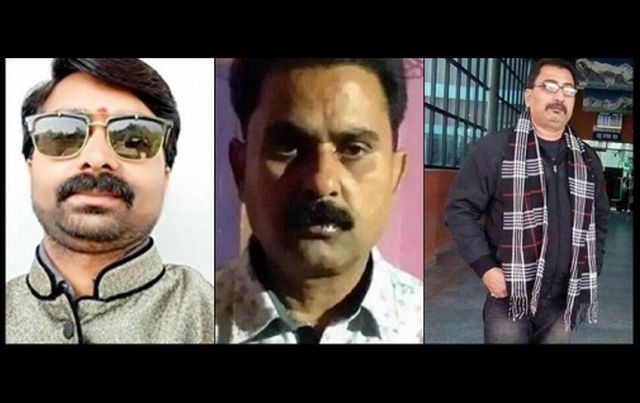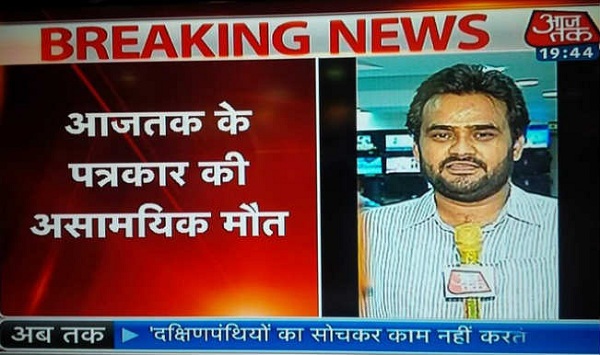
by Editor | May 25, 2021 | Media, News

Sandeep Sharma, Navin Nishchal and Vijay Singh
New Delhi : Press freedom in India has deteriorated in 2018 and three journalists have been killed in the first four months, media watchdog The Hoot said, stating that “journalists continue to be vulnerable”.
The number of killings documented by the Hoot report for the first four months was the same as in the whole of 2017.
“They were killed in connection with their reporting, judging by what initial investigations show,” it said.
India ranks 138th among 180 countries on this year’s World Press Freedom Index, published by Reporters Without Borders. India’s rank was 136th in 2017 and 133rd in 2016.
The number of documented attacks on journalists and media workers across the country during the period was 13. It includes three in West Bengal. In 2017, documented attacks stood at 46.
Apart from these, there were defamation cases that came to trial. A sedition case was filed against a journalist. There was also a clear push by both the State, Centre and the judiciary — through regulatory policy as well as judicial orders — to curb free speech, The Hoot said.
“Media freedom continued to deteriorate in the first four months of 2018 in India,” said the non-profit watchdog.
“There were also around 50 instances of censorship and more than 20 instances of suspension of Internet services as well as the taking down of online content,” it added.
All three journalists killed in the January-April period were mowed down by vehicles.
On March 26, two Dainik Bhaskar journalists — Navin Nishchal and Vijay Singh — were killed when their bike was hit by an SUV in Bhojpur in Bihar.
Police said the vehicle was driven by a village leader and that a heated argument between him and the reporters over a news report had preceded the “accident”.
A day later, television reporter Sandeep Sharma was mowed down by a truck in Bhind, Madhya Pradesh. Sharma, who had done a sting operation on a sand mining mafia in Bhind, had told police that he had received threats to his life, it said.
Hoot’s investigation revealed that politicians, businessmen, members of Hindu right wing groups, police and paramilitary forces, government agencies like the film certification board, the Information and Broadcasting Ministry, state governments, lawyers and even media groups had acted to undermine freedom of expression.
India’s record on press freedom has remained poor and has been deteriorating over the last couple of years.
The Hoot report, however, said: “Despite the ominous number and range of attacks on freedom of expression, the ongoing struggle to resist these curbs does yield results.”
In April, an injunction on the publication of a book on yoga guru and businessman Baba Ramdev was lifted by a district court in Delhi.
—IANS

by Editor | May 25, 2021 | Media, News
 New Delhi : Several journalists organisations on Thursday protested the reconstitution of the Central Press Accreditation Committee (CPAC), saying the nominees of the representative organisations have not been included.
New Delhi : Several journalists organisations on Thursday protested the reconstitution of the Central Press Accreditation Committee (CPAC), saying the nominees of the representative organisations have not been included.
The organisations demanded that the newly-constituted CPAC should be scrapped and a new committee be constituted by giving representation to all the organisations.
In a joint statement issued here on Thursday, the Indian Journalists Union (IJU), Press Association (PA), Working News Cameramen Association (WNCA) and National Union of Journalists (India) (NUJ-I) said that it was for the first time that the CPAC was constituted by the Press Information Bureau (PIB) by “cherry picking” journalists in the committee.
“It is very unfortunate that the present Central Press Accreditation Committee does not have a representative character to protect the interests the working journalists and their collective voice is excluded,” said the statement.
It said the government had chosen to send a strong signal to the working journalists that “it will have its way in giving or denying accreditations to working journalists. This amounts to an attack on independent journalism and is not acceptable”.
Meanwhile, the organisations welcomed the decision of the I&B Ministry to nominate journalists on the Journalists Welfare Committee.
—IANS

by Editor | May 25, 2021 | Media, Muslim World
 Kabul : Twenty journalists and media workers were killed in violence in Afghanistan in 2017, the Afghan Journalists Safety Committee (AJSC), an independent media safety group protecting the reporters’ rights, said on Friday.
Kabul : Twenty journalists and media workers were killed in violence in Afghanistan in 2017, the Afghan Journalists Safety Committee (AJSC), an independent media safety group protecting the reporters’ rights, said on Friday.
Last year was the deadliest for journalists and media in the history of Afghanistan, with 67 percent increase of incidents against them compared to 2016, AJSC said in a statement on its website.
The AJSC recorded a total of 169 incidents of violence and intimidation, including killing, injury, beating, detention, threats and verbal assault of journalists and media workers, Xinhua news agency reported.
The statement said “20 journalists were killed, all by the Taliban and the Afghanistan branch of Islamic State (IS) group.
“The remarkable rise in the level of violence against journalists and media workers in Afghanistan is a matter of great concern for us and for the media community at large,” Najib Sharifi, head of AJSC, was quoted as saying.
The media support committee called on all warring groups including the Taliban and IS to refrain from attacking journalists and media workers.
At least 13 journalists were reportedly killed in 2016 in the war-torn country.
—IANS

by Editor | May 25, 2021 | Media, World
 Geneva : More than 30 journalists have been killed in targeted attacks this year, two UN Special Rapporteurs announced.
Geneva : More than 30 journalists have been killed in targeted attacks this year, two UN Special Rapporteurs announced.
Speaking ahead of the International Day to End Impunity for Crimes Against Journalists, the Special Rapporteurs on arbitrary, summary and extrajudicial executions, Agnes Callamard, and on freedom of expression, David Kaye, called on states to take actions in this regard, reports Xinhua news agency.
“In addition to taking individual lives and depriving family members of their loved ones, these attacks aim to destroy the public watchdog role of journalism that is essential to democratic society,” they said in a joint statement issued on Wednesday.
According to them, the attacks on journalism were widespread and deplorable.
“When authorities fail to follow up such attacks with independent and impartial investigations that can bring perpetrators to justice, the killers and their allies achieve their objectives,” the statement said.
The attacks need to stop, they said, adding that so too does the public demonisation of reporting and specific media outlets and reporters by political leaders at the highest levels.
“Our societies cannot afford to continue this downward spiral of attacks against journalists. We urge all States – in word and action – to devote resources to reverse this trend,” it added.
A UN General Assembly resolution in 2013 designated November 2 the International Day to End Impunity for Crimes Against Journalists.
—IANS

by Editor | May 25, 2021 | Employment, News, Private Jobs

Aaj Tak Reporter Akshay Singh; Photo Credit India.com
Mumbai: The Mumbai Press Club demands an immediate CBI inquiry into the mysterious death of Aaj Tak reporter Akshay Singh. Any delay in ordering the probe will only strengthen the perception that India is sinking to the depths of another ‘failed’ Banana Republic.
Like others, who have died under mysterious circumstances, Akshay’s death needs to be probed by the CBI rather than Madhya Pradesh’s SIT, which depends on the state police for inputs and information. Nothing short of ordering a CBI probe into Akshay’s death is acceptable. We also urge Prime Minister Narendra Modi to break his silence on this perplexing and tragic issue.
Mumbai Press Club also deeply mourns the death of Akshay Singh, special correspondent of Aaj Tak, who died investigating and reporting the Vyapam scam at Ujjain, in Madhya Pradesh. We stand by the Dahod-based family of Singh, who was just 38.
Whatever may be the autopsy report, the case should not be treated as normal as we over the last one month have seen reports of many similar and unnatural deaths of people connected with the Vyapam scam, be it witnesses, accused, suspects, investigators and beneficiaries.
The death of Akshay has come at a time when the journalist fraternity is yet to come to terms with the burning to death of Jagendra Singh of Shahjahanpur in Uttar Pradesh and Sandeep Kothari of Balaghat in Madhya Pradesh, whose burnt body was found in Wardha district of Maharashtra. The two back-to-back similar incidents have come as a shock and a wake up call for all media persons.
Mumbai Press Club also demand an immediate sacking of MP minister Kailash Vijayvargiya who has been accused of showing appalling insensitivity with his dismissive comment on Akshay.
On its part, the Mumbai Press Club has taken the lead in helping file a case in the Supreme Court demanding a CBI Inquiry and is in touch with different journalist associations, organisations, federations and bodies in UP and New Delhi. The Club will also be extending some financial assistance to the bereaved families of the dead journalists.
The Mumbai Press Club has also set up a fact-finding team in collaboration with the Nagpur Union of Working Journalists to visit Nagpur, Wardha and Balaghat and investigate the brutal murder of journalist Kothari.





